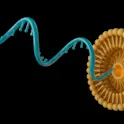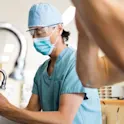
Health
01 Jul 2025
Cheese may really be giving you nightmares, scientists find
Scientists find lactose intolerance may link consuming dairy, bad dreams, and poor sleep.

Health
01 Jul 2025
Scientists find lactose intolerance may link consuming dairy, bad dreams, and poor sleep.

Health
26 Jun 2025
Rare diseases affect millions worldwide, yet the one-size-fits-all model of drug development leaves patients with few treatment options. Now a European research project called NANOSPRESSO aims to tip the balance in patients’ favor by boosting access to low-cost bespoke gene and RNA therapies.

Health
25 Jun 2025
Researchers from the US have reported the initial results from the first quantitative study to focus on the contribution of multiple new psychoactive substances (NPS) from a range of classes to roadway crashes in the US. They found that 2% of 1,000 adults who visited one of two trauma centers in California within six hours after being involved in a roadway crash had traces of NPS in their blood. The most frequent were bromazolam, para-fluorofentanyl, and mitragynine. In most (88%) of these positive cases, NPS had been taken together with traditional recreational drugs such as fentanyl, methamphetamine, and cocaine. These results indicate that NPS are a new concern in roadway crashes and put lives at risk.

Health
06 Jun 2025
It has been suggested that statins could boost the chances of survival of patients with sepsis because of their multipronged effects on inflammation. Here, researchers from China used the MIMIC-IV database to perform a retrospective cohort study on two large, matched groups: critically ill patients with sepsis in the Beth Israel Deaconess Medical Center who received standard of care with or without statins. The 28-day all-cause mortality was 39% lower in relative terms [an absolute reduction from 23.4% to 14.3%] in the statin group, suggesting a protective effect. Previous randomized controlled trials that didn’t find any such benefit might have been too small or have had other weaknesses. The present results need to be confirmed in a large, well-designed randomized clinical trial.

Health
27 May 2025
A study on Middle Eastern countries links higher temperatures to an increased risk of breast, ovarian, uterine, and cervical cancers.

Health
09 May 2025
At Frontiers, we bring some of the world’s best research to a global audience. But with tens of thousands of articles published each year, it’s impossible to cover all of them. Here are just five amazing papers on the power of hormones you may have missed.

Health
08 May 2025
Prof Eliane Candiani Arantes and Prof Manuela Berto Pucca are co-authors of a newly published Frontiers in Public Health article that focuses on the rising number of scorpion stings straining Brazil’s public health system. In this latest Frontier Scientist installment, they talk about their research and careers.

Health
29 Apr 2025
Authors from the US have now published a new in study in Frontiers in Physiology. They showed that female athletes are rapidly catching up with, and may soon overtake, their male peers in sports events under extreme physiological circumstances.

Health
24 Apr 2025
Research showed parents of children who struggle with attending school regularly feel the effects of school distress across all aspects of their lives, rating it as the second most threatening possible life event.

Health
15 Apr 2025
High percentages of adverse birth outcomes in vulnerable communities could be alleviated by reducing odds to the same levels less vulnerable women experience

Health
31 Mar 2025
Using a screen in bed at night makes it much more likely you’ll sleep less and sleep badly — but social media use is no worse than any other form of screen use.

Health
07 Mar 2025
Dr George Musgrave is both a musician and an academic, with first-hand experience of the music industry’s challenges. In this guest editorial, inspired by their moving and urgent new article in Frontiers in Public Health, he and co-author Dr Dorian Lamis, who is a clinical psychologist and suicide prevention expert, turn the spotlight on the toll of death by suicide in the music industry, and call for immediate action to support vulnerable artists.

Health
03 Mar 2025
International Women’s Day celebrates the social, economic, cultural, and political achievements of women and aims to accelerate women’s equality. Gearing up for March 8th, we’re highlighting recent Frontiers research on women’s health, professional lives, and societal status.

Health
14 Feb 2025
Researchers from Spain sampled sink drains from different wards in a single modern university hospital where state-of-the-art cleaning protocols are adhered to. Through culturing and DNA barcoding, they found 67 species of bacteria. These included Klebsiella, Enterobacter, and Pseudomonas aeruginosa, notorious for their potential to cause healthcare-associated infections. Several strains detected proved resistant to modern antibiotics, including cephalosporins and carbapenems. Sink drains thus appear to function as reservoirs for known and emerging pathogens of concern.

Health
31 Jan 2025
The auricular muscles, which helped our distant ancestors move their ears to improve hearing quality, activated when people were trying to listen to competing sounds.
Get the latest research updates, subscribe to our newsletter